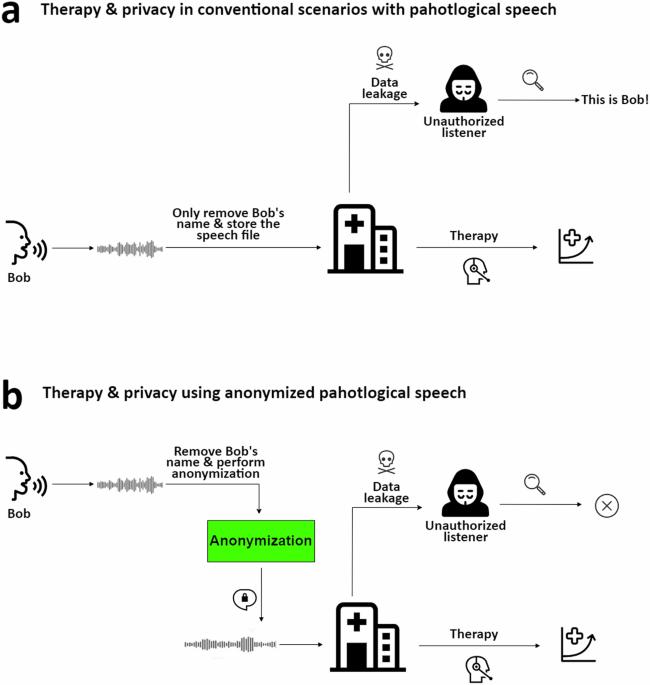Addressing challenges in speaker anonymization to maintain utility while ensuring privacy of pathological speech
IF 5.4
Q1 MEDICINE, RESEARCH & EXPERIMENTAL
引用次数: 0
Abstract
Integration of speech into healthcare has intensified privacy concerns due to its potential as a non-invasive biomarker containing individual biometric information. In response, speaker anonymization aims to conceal personally identifiable information while retaining crucial linguistic content. However, the application of anonymization techniques to pathological speech, a critical area where privacy is especially vital, has not been extensively examined. This study investigates anonymization’s impact on pathological speech across over 2700 speakers from multiple German institutions, focusing on privacy, pathological utility, and demographic fairness. We explore both deep-learning-based and signal processing-based anonymization methods. We document substantial privacy improvements across disorders—evidenced by equal error rate increases up to 1933%, with minimal overall impact on utility. Specific disorders such as Dysarthria, Dysphonia, and Cleft Lip and Palate experience minimal utility changes, while Dysglossia shows slight improvements. Our findings underscore that the impact of anonymization varies substantially across different disorders. This necessitates disorder-specific anonymization strategies to optimally balance privacy with diagnostic utility. Additionally, our fairness analysis reveals consistent anonymization effects across most of the demographics. This study demonstrates the effectiveness of anonymization in pathological speech for enhancing privacy, while also highlighting the importance of customized and disorder-specific approaches to account for inversion attacks. When someone’s way of speaking is disrupted due to health issues, making it hard for them to communicate clearly, it is described as pathological speech. Our study explores whether this type of speech can be modified to protect patient privacy without losing its ability to help diagnose health conditions. We evaluated automatic anonymization for over 2,700 speakers. The results show that these methods can substantially enhance privacy while still maintaining the usefulness of speech in medical diagnostics. This means we can keep speech data private whilst still being able to use it to identify health issues. However, our results show the effectiveness of these methods can vary depending on the specific condition being diagnosed. Our study provides a method that can help maintain patient privacy, whilst highlighting that further customized approaches will be required to ensure optimal privacy. Tayebi Arasteh et al. investigate the impact of speaker anonymization on pathological speech, focusing on preserving pathological utility while safeguarding patient privacy. Their study reveals privacy improvements with minimal utility loss across most disorders, highlighting the need for disorder-specific anonymization strategies.

应对扬声器匿名化的挑战,在确保病态语音隐私的同时保持实用性
由于语音具有作为包含个人生物特征信息的非侵入性生物标志物的潜力,因此将语音整合到医疗保健中加剧了人们对隐私的关注。为此,说话者匿名化技术旨在隐藏个人身份信息,同时保留关键的语言内容。然而,匿名技术在病理语音中的应用还没有得到广泛的研究,而病理语音是一个对隐私尤为重要的关键领域。本研究调查了匿名化对病理语音的影响,涉及来自德国多个机构的 2700 多名发言者,重点关注隐私、病理效用和人口统计学公平性。我们探索了基于深度学习和信号处理的匿名化方法。我们记录了各种病症在隐私方面的显著改善--表现为同等错误率增加高达 1933%,而对效用的总体影响却微乎其微。构音障碍、发音障碍、唇腭裂等特定疾病的效用变化极小,而失语症则略有改善。我们的研究结果表明,匿名化对不同疾病的影响大不相同。这就需要针对不同疾病的匿名化策略,以便在隐私与诊断效用之间取得最佳平衡。此外,我们的公平性分析表明,匿名化对大多数人群的影响是一致的。这项研究证明了病理语音中的匿名化对提高隐私的有效性,同时也强调了针对特定疾病的定制化方法对反转攻击的重要性。当一个人因健康问题导致说话方式紊乱,难以清晰交流时,就被称为病态语言。我们的研究探讨了能否对这类语音进行修改,以保护患者隐私,同时又不丧失其帮助诊断健康状况的能力。我们对 2,700 多名发言者的自动匿名化进行了评估。结果表明,这些方法可以大大提高隐私保护,同时仍能保持语音在医疗诊断中的有用性。这意味着我们可以在保持语音数据隐私的同时,还能利用它来识别健康问题。不过,我们的研究结果表明,这些方法的有效性会因诊断的具体病症而异。我们的研究提供了一种有助于维护病人隐私的方法,同时强调需要进一步定制方法来确保最佳隐私。Tayebi Arasteh 等人研究了说话者匿名化对病理语音的影响,重点是在保护病人隐私的同时保留病理效用。他们的研究显示,在大多数病症中,隐私得到了改善,而效用损失却最小,这突出表明需要针对特定病症的匿名化策略。
本文章由计算机程序翻译,如有差异,请以英文原文为准。
求助全文
约1分钟内获得全文
求助全文

 求助内容:
求助内容: 应助结果提醒方式:
应助结果提醒方式:


